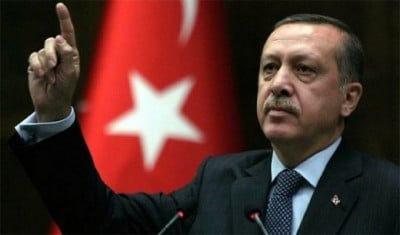Turkey Helped Instigate Uprising in Kazakhstan to Advance “Great Turan” Project

All Global Research articles can be read in 51 languages by activating the “Translate Website” drop down menu on the top banner of our home page (Desktop version).
To receive Global Research’s Daily Newsletter (selected articles), click here.
Visit and follow us on Instagram at @globalresearch_crg.
***
Ankara is seemingly more emboldened than ever as early signs show that the bloody unrest that engulfed Kazakhstan had significant Turkish involvement, not only through its intelligence services, but also through Kazakhstan’s Turkey-oriented politicians and business community.
The Kazakh elite, led by its leader Nursultan Nazarbayev, expedited the development of multilateral relations and established an alliance with Ankara. This alliance was cultivated under the formula of a “multi-vector course”, with inspiration of a supranational entity called “Great Turan.”
“Great Turan” is a relatively new concept born out of fringe nationalist movements that opposed the Russian Empire and Soviet Union. It was also propelled in Turkey by Kemalist ideology to Turkify Anatolian Muslims and Christians alike. Today, one of the greatest champions of a “Great Turan” – the ideology of unifying Turkic-speaking people from the Balkans to Siberia and Xinjiang, is Turkish President Recep Tayyip Erdoğan.
It is recalled that when speaking to the Organization of Turkic States, Erdoğan said:
“Turkistan is our ancestral home, our main hearth. We are a very large family of 300 million people who speak the same language, believe in the same religion, have the same history, culture, share the same civilization. I know that our Kazakh, Kyrgyz, Uzbek, Tajik and Turkmen brothers look at Turkey the same way we do. They consider Turkey their home.”
Turkey has consistently worked towards this “Great Turan” project since the collapse of the Ottoman Empire left the country as a rump state in Anatolia. First was the 1939 grab of Liwa Iskenderun, now Hatay Province, from Syria. Then there was the 1974 invasion of northern Cyprus. The 2010’s saw more areas of northern Syria occupied by Turkey. Next was Turkey’s direct assistance to Azerbaijan’s 2020 invasion of Nagorno-Karabakh as the two country’s share the ideology of “one nation, two states. ”Azerbaijan is important for Turkey as it is the country’s gateway to Central Asia and its riches, especially Kazakhstan with its innumerable natural resources. Uranium ore deposits alone, as an example, are estimated at more than 40% of the world’s total.
For Ankara to become a dominant force in Central Asia, it must break Russia’s influence, and in this way has been engaged in a number of projects to propel this. This includes encouraging Kazakhstan’s switch from the Cyrillic to the Latin alphabet. Also, about a hundred mosques and madrasahs have been built in Kazakhstan with Turkish funding to Islamize the country and break it from its Soviet-era secularism.
More than 200 officers of the Kazakh army graduated from Turkish military institutions. Annually, hundreds of Kazakh military personnel, including the highest echelon of the military leadership, are sent to Turkey to improve their professional training for short-term courses. In recent years, Kazakhstan has actively purchased Turkish-made infantry fighting and armored vehicles, and is keen to purchase bayraktar drones.
Erdoğan had no choice but to express formal support for the Kazakh decision to request peacekeeping assistance from the Collective Security Treaty Organization (CSTO). The Turkish leader was hoping that President Kasym-Zhomart Tokayev would be undecided and delay requesting CSTO assistance so that pro-Turkish-minded local politicians and major businessmen could be activated. This was in the hope that they would create enough pressure to demand Turkish troops be deployed in order to stabilize the country.
Albeit, this is far from what actually happened as the Kazakh president acted decisively.
Tokayev said there was a “single center” coordinating the uprising in Kazakhstan. Acording to geopolitical analyst and journalist Pepe Escobar, Tokayev was referring to a ‘secret’ US-Turk-Israeli military-intel operations room based in the southern business hub of Almaty. Escobar reported that there were 22 Americans, 16 Turks and 6 Israelis in the center and were coordinating sabotage gangs – trained in West Asia by the Turks – and then rat-lined to Almaty. However, their operation unravelled when Kazakh forces – with the help of Russian/CSTO intel – retook control of the vandalized Almaty airport, which was supposed to be turned into a hub for receiving foreign military supplies.
Escobar speculated that “the Hybrid War west had to be stunned and livid at how the CSTO intercepted the Kazakh operation at such lightning speed” and that the Secretary of the Russian National Security Council, Nikolai Patrushev, was able to prepare for a potential Color Revolution as he “saw the Big Picture eons ago.”
Despite this setback, Erdoğan will not abandon his attempts to return to Kazakhstan and will continue to pursue a “Great Turan.” Time will tell whether Kazakhstan will be able to solve internal problems of national security, but the continuation of the “multi-vector course” is unlikely to ensure consistent stability in the Central Asian country.
*
Note to readers: Please click the share buttons above or below. Follow us on Instagram, @crg_globalresearch. Forward this article to your email lists. Crosspost on your blog site, internet forums. etc.
Paul Antonopoulos is an independent geopolitical analyst.

